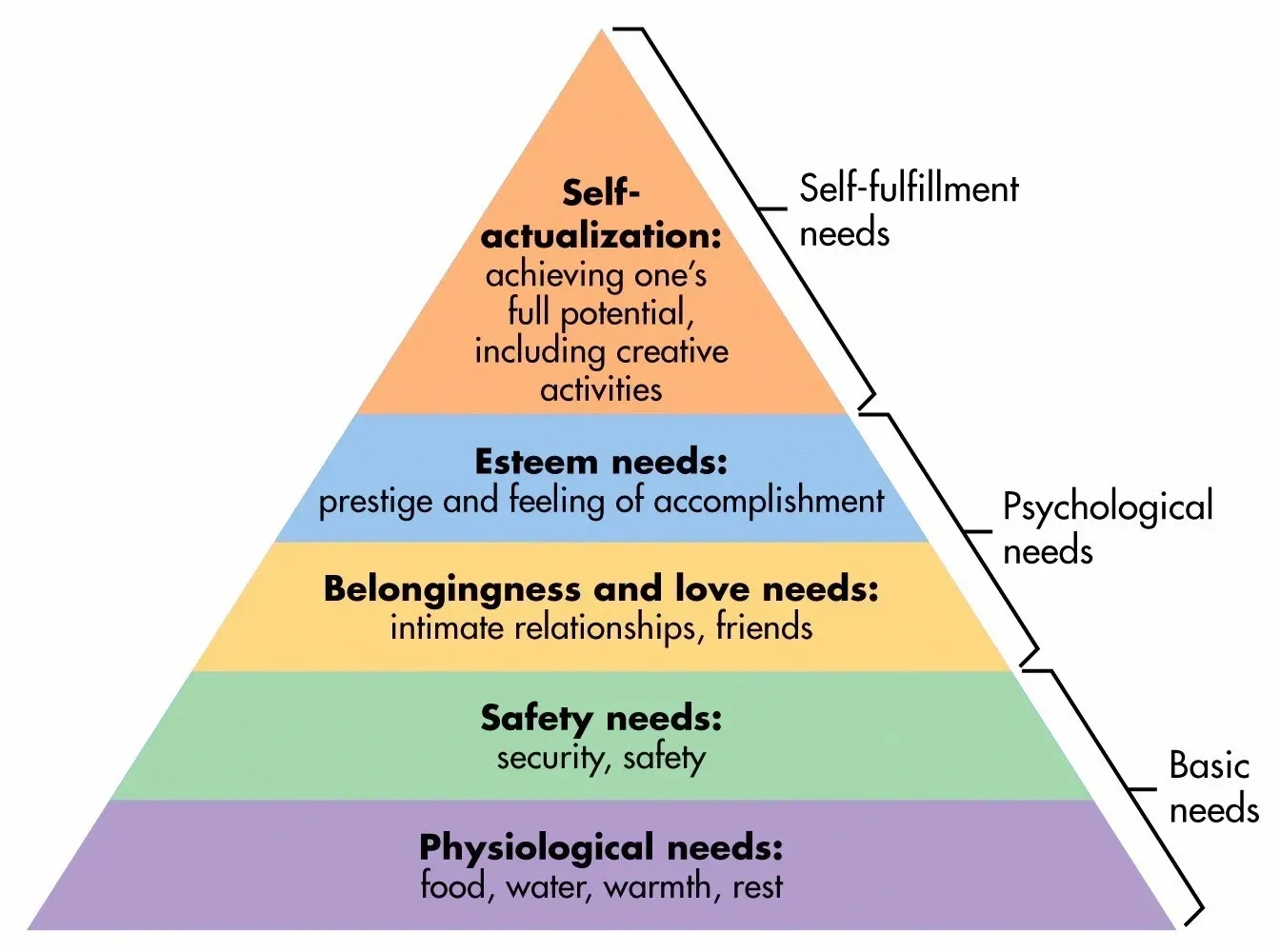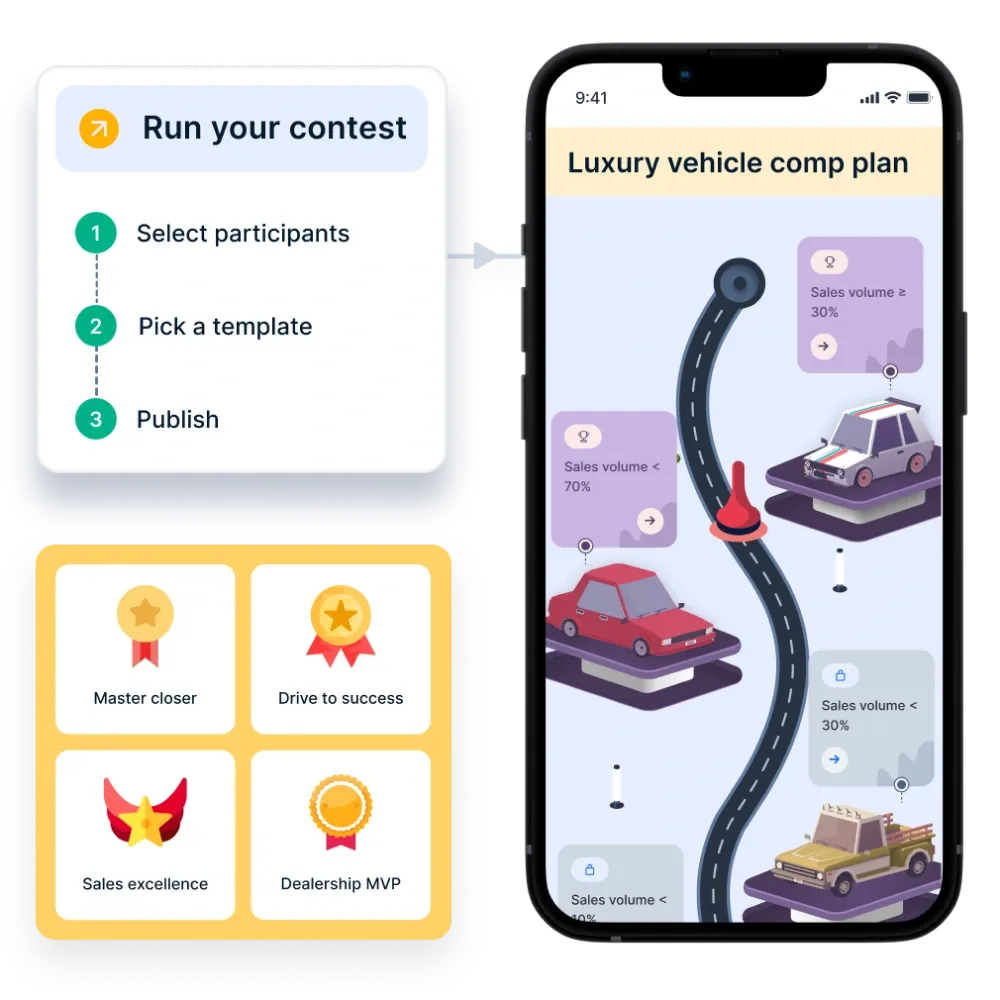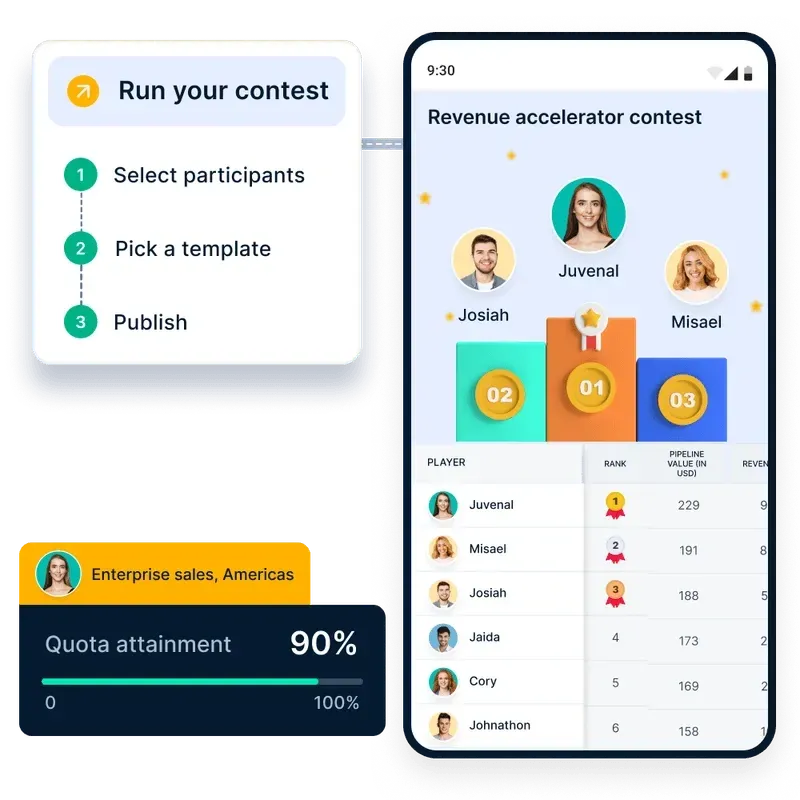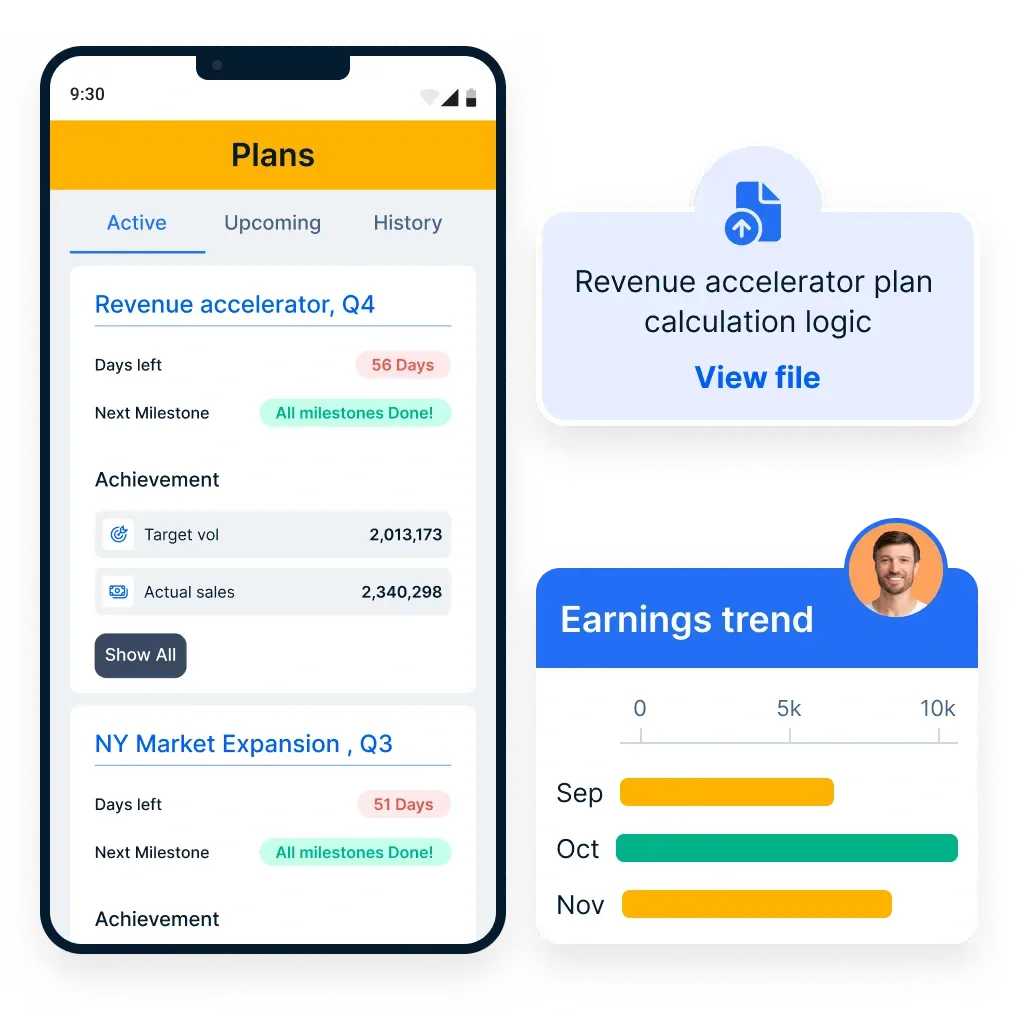Sales Team Incentives That Actually Motivate and Drive Results
Sales incentives aren’t just about commissions—they’re about creating a culture of motivation and performance. The right incentives for sales staff include career growth, autonomy, financial security, and personalized rewards that keep teams engaged long-term.

On this page
“Working hard for something we don’t care about is called stress. Working hard for something we love is called passion”. - Simon Sinek
For managers, the challenge has always been the same—how to make work something employees genuinely care about. How do you shift the mindset from stress to passion? The question has become even more critical in a world where teams are increasingly remote, economies are unstable, and traditional motivation tactics, like higher commissions, fail to create long-term engagement.
It’s tempting to assume that higher commissions or bonuses will automatically boost performance. But the reality? Financial incentives alone don’t build a high-performance culture.
Sales reps may work harder in the short term, but once the novelty fades, motivation drops, and the cycle repeats. If businesses rely only on sales team incentives tied to financial rewards, they risk overlooking what truly drives sales professionals—growth, recognition, autonomy, and long-term security.
Psychologist Abraham Maslow’s Hierarchy of Needs explains this well. At the foundation, people seek security—covered by salaries and basic compensation. But true motivation comes higher up the pyramid, where employees strive for personal growth, achievement, and purpose in their roles.

To create effective incentives for sales staff, managers need to rethink their approach. In this article, we’ll explore five powerful strategies that go beyond commissions—offering sales incentives that don’t just push numbers but build a culture of high performance.
Incentives that go beyond money (and why they work)
Sales professionals thrive on more than just commissions. They want to grow, feel valued, and know their efforts contribute to something bigger. While financial rewards provide short-term motivation, true engagement comes from incentives that support personal development, autonomy, and long-term success.
Abraham Maslow’s Hierarchy of Needs helps explain why. At the base of the pyramid are physiological and security needs—covered by salaries and bonuses. But sales reps don’t stay engaged just because their paycheck clears. They crave higher-level needs like recognition, self-growth, and purpose.
Why traditional incentives fall short
- Money loses its impact over time: A pay bump is exciting at first, but the motivation fades once it becomes the norm.
- Reps seek meaning, not just money: Feeling like a valued contributor to a company’s success creates lasting motivation.
- Burnout is real: Pressure to hit quotas without personal incentives can lead to disengagement and high turnover.
What works instead?
High-performing sales teams align incentives with what truly drives motivation. They introduce rewards that:
- Encourage career growth: Training programs, certifications, and mentorship opportunities.
- Give more autonomy: Remote work, flexible schedules, and travel perks.
- Provide long-term financial security: Stock options, investment opportunities, and wealth-building benefits.
- Make work exciting: Gamification, instant recognition, and non-monetary rewards like experiences.
Building urgency in sales isn’t just about pushing deals—it’s about keeping the team engaged and motivated every single day. The right incentives create a culture where sales reps push harder, not because they have to, but because they want to.
The modern sales incentives to motivate them and build a high-performance culture
A high-performing sales culture isn’t built on commissions alone. Sales reps need incentives that push them to excel, not just chase quotas. The best sales incentives balance recognition, growth, autonomy, and financial security—giving reps a reason to stay motivated beyond their next paycheck.
Here’s how top sales leaders structure incentives that drive sustained performance:
1. Education as a sales incentive: A smart investment in growth
We know what you’re thinking—who would ever choose education over money? On the surface, it sounds like the worst sales incentive pitch ever:
"You’ve exceeded our expectations this quarter. As a reward, here’s more training!"
And you’d be right—if the education is strictly work-related. Mandatory training sessions or extra product courses might not feel like much of a reward. But when learning is focused on personal growth beyond the workplace, the value changes entirely.
Take learning a second language, for example. Studies show that being bilingual improves multi-tasking, objective reasoning, and even cognitive longevity—all valuable skills in life and business. For a sales rep working with international clients, this isn’t just a personal asset—it’s a competitive advantage.
To motivate and engage your sales team, consider offering educational incentives tied to performance milestones. This could mean:
- Private language lessons after hitting a sales target.
- Leadership development courses for top performers.
- Access to personal enrichment programs, like negotiation skills or public speaking workshops.
2. Work-from-home as a sales incentive: A win for both reps and employers
The shift to remote work has proven that sales teams don’t need to be in the office to be productive. In fact, many companies have found that work-from-home (WFH) arrangements boost efficiency, making it a powerful addition to sales team incentives.
For employees, the benefits of WFH are obvious:
- More time with family.
- Less time and money spent on commuting.
- A greater sense of comfort and independence.
But the advantages don’t stop with the workforce. Employers also gain from remote flexibility. According to a Global Workplace Analytics study, companies that implement half-time WFH arrangements save an average of $11,000 per employee per year.
Tech leaders like Google, Microsoft, and Facebook have extended their remote work policies indefinitely, proving that WFH isn’t just a pandemic response—it’s a long-term productivity strategy. However, this model isn’t limited to tech giants. SMEs can benefit too.
Take Loganix, a full-suite SEO agency, as an example. Their “work from anywhere” policy isn’t just a perk—it’s a key to their success. While they operate location-based services in Vancouver, their partially distributed workforce gives them an edge through flexibility, trust, and global talent diversity.
For companies looking to create incentives for sales staff, WFH perks can be a game-changer. A well-structured remote work policy, paired with training on productivity strategies, provides a win-win scenario—keeping top sales talent motivated while improving company efficiency.
3. Investment based incentives: Securing long-term financial stability for sales teams
A competitive salary and fair commission structure provide financial comfort, but they don’t guarantee long-term financial security. To truly support your sales team, offering investment-based incentives can make a significant impact.
These go beyond standard retirement funds or 401(k) plans, allowing employees to build wealth passively without the burden of complex financial planning.
A strong and diverse benefits package makes your company more attractive to top sales talent. A study by the American Institute of CPA found that 80% of employees would stay with a job that offered strong benefits over a position with a 30% pay increase but no benefits. This proves that financial security isn’t just about salary—it’s about long-term planning.
Tailoring investment incentives for sales teams
Modern investment plans allow companies to customize financial benefits to align with their employees' personal and professional goals. For example, if your sales team’s average age is 35 and 90% have children, an ideal incentive for sales teams could be a custodial investment account for their kids.
Platforms like EarlyBird offer ETF-based investment portfolios designed for long-term, low-risk growth. Employees can passively build financial security for their families, reinforcing a sense of stability and commitment to their employer.
The impact of financial incentives on retention
When companies invest in their employees’ future financial well-being, it creates a lasting bond of trust and loyalty. Offering investment-based incentives for sales staff isn’t just about helping them grow their wealth—it’s about showing them that their hard work today translates into long-term financial stability.
4. Life Insurance as a Sales Incentive: A Benefit That Truly Matters
Has there ever been a more critical time to consider life insurance? Despite its importance, it remains a confusing and often overlooked topic for employees. Individual policies come with higher premiums, complex enrollment processes, and coverage limitations.
That’s why employer-provided life insurance is one of the most valuable incentives for sales teams—it’s convenient, cost-effective, and provides financial security.
For employees, the benefits are clear:
- Low-cost or free coverage compared to individual policies.
- Customizable plans that account for health conditions and life changes.
- Peace of mind knowing their families are protected.
For employers, offering life insurance isn’t just a perk—it’s a strategic move. Maslow’s Hierarchy of Needs highlights physiological security as a foundation for motivation. When employees feel secure, they can focus on career growth, performance, and self-actualization.
Imagine the impact on motivation if your sales team knew their loved ones were financially protected. The added sense of security translates into higher engagement, loyalty, and long-term commitment.
To streamline the process, companies can use concierge-like insurance services to find the best policies tailored to their team’s needs. Platforms like TrueBlue simplify enrollment, ensuring coverage is both comprehensive and hassle-free. Plus, your accounting team will appreciate the reliability—the quote given is the price paid.
When looking for incentives for sales staff, life insurance is more than just a benefit—it’s a meaningful investment in your team’s well-being and long-term motivation.
5. Personalized incentives: The secret to sales team motivation
Not all incentives for sales teams work the same way for everyone. While some reps are driven by financial rewards, others find more motivation in time off, experiences, or personal growth opportunities. The best way to figure out what truly drives your salespeople? Ask them.
Your team is made up of individuals with different backgrounds, priorities, and lifestyles. They don’t all commute the same way, work the same hours, or have the same career goals—so why should they all be motivated by the same incentives for sales staff?
Why personalized incentives work
Instead of assuming what motivates your team, let them tell you what would drive them to perform at their best. You might be surprised at how cost-effective and practical their requests are:
- A top-performing parent might appreciate three consecutive Fridays off (PTO) to spend time with their kids.
- An ambitious sales rep crushing quarterly targets might value an expense-paid adventure day or exclusive experience.
- Some reps may prefer personal development incentives, such as leadership training or industry event tickets.
By offering customized rewards, sales managers can make their team feel genuinely valued rather than just another number. A well-structured, personalized incentive program doesn’t just boost short-term motivation—it creates long-term loyalty and drives continuous performance improvements.
Compass: Elevating sales incentives with gamification & real-time rewards
Traditional sales incentives can only do so much. To truly drive engagement and performance, sales teams need instant recognition, competition, and dynamic rewards. That’s where Compass transforms the game—bringing gamification, AI-driven contests, and real-time performance tracking into your sales incentive strategy.
AI-powered sales contests

Instead of relying on static leaderboards, Compass enables dynamic sales competitions that adjust based on performance trends. Whether it's a daily sprint or a long-term challenge, sales reps stay engaged with personalized challenges that push them to outperform themselves and their peers.
Live leaderboards & race-themed challenges

Visibility fuels competition. Compass provides real-time leaderboards that allow reps to track their progress against others. Race-themed contests add urgency, driving faster deal closures and improving overall sales velocity. Sales teams see exactly where they stand and are motivated to push harder.
Instant incentive payouts

Waiting until the end of the month for commissions can weaken motivation. Compass ensures top performers get rewarded immediately, keeping the excitement high and reinforcing winning behaviors in real-time. With automated incentive tracking, rewards are instant, transparent, and error-free.
Community-driven motivation

Sales can be competitive, but that doesn’t mean it can’t be collaborative. Compass creates a sense of community where team members can celebrate wins, challenge each other, and share strategies to boost performance. By fostering healthy competition, sales teams don’t just aim for individual success—they help the entire team win.
With Compass, incentives for sales teams go beyond bonuses. It’s about making success exciting, trackable, and rewarding in the moment—keeping sales reps engaged, motivated, and always striving for the successive big win.
Gamify incentives, track performance in real time, and reward top reps instantly with Compass. Get started today!
Conclusion
Sales incentives should do more than just push numbers—they should motivate, engage, and retain top talent. The best-performing teams don’t rely solely on commissions; they offer growth opportunities, flexibility, financial security, and personalized rewards that drive sales reps long-term.
By redefining incentives for sales teams, companies can create a culture where success is not just expected but consistently achieved. A mix of education, autonomy, gamification, and customized perks ensures that motivation isn’t temporary—it becomes part of how the team operates daily.






